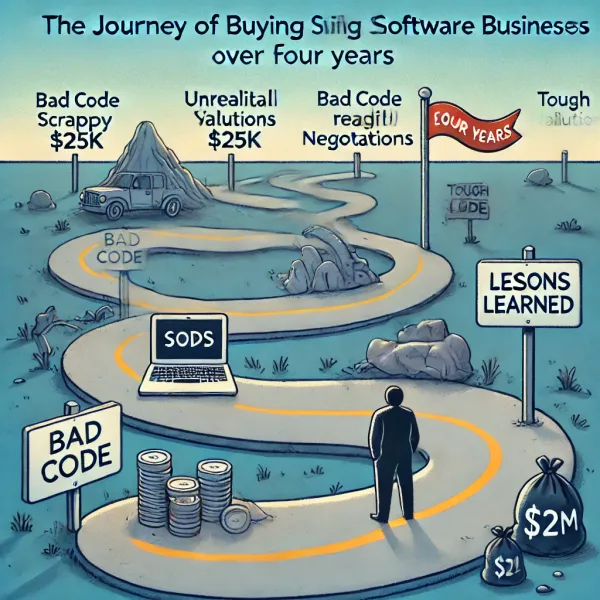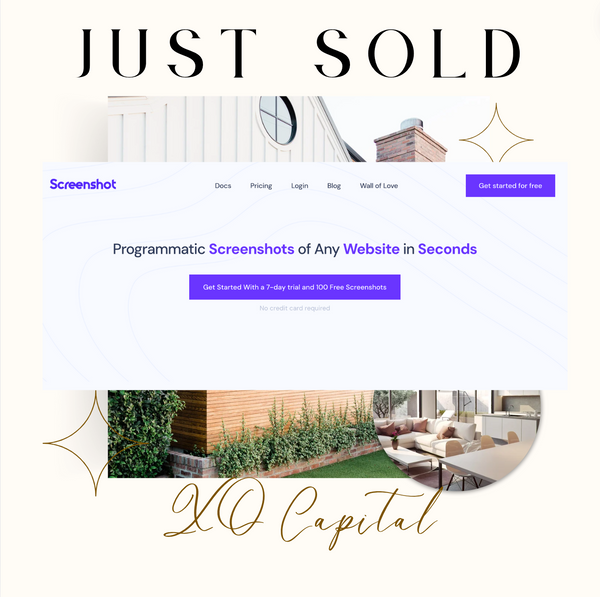Crafting Your Ideal Micro-Acquisition Profile: Discovering Your Buy Box for Success

This post is for people looking to buy their first company. You could be an entrepreneur with a successful company already and looking to expand or an acquisition entrepreneur looking to buy a business you can operate yourself.
Flip Fund
We have $485k committed to the Flip Fund (!!!!!). We will be closing the round end of Aug / 1st week of September.
Watch:
Listen:
XO's Current Buy Box:
- $10k - $30k MRR
- B2B SaaS
- 80%+ Gross Margins
- 50+ customers
- Product Led Growth (i.e. freemium, free trials)
- Limited platform risk
- Ideally nodejs / react tech stack
Price
Price is an easy one to start with. How much can you afford? And how much risk do you want to take?
Our first acquisition was $25k for a product making $550 a month. It's screenshotapi.net and we still own it today. Our most recent acquisition was in the high 6-figures. It took us 3 years to bridge this gap and get comfortable with bigger numbers.
There are really only two paths. Start small and build up, or go bigger first and hire an operator. If I could do XO over again, I’d take my time and buy bigger and immediately hire a full time operator (with enough revenue to also hire a full time engineer). That being said at the time I started XO I didn’t have the capital to execute on this. Even today, we’d likely have to sell our entire portfolio to get the cash to buy a business doing around $400k - $500k to execute on this. Then, of course, there’s really no profit until you sell (or unless you have tremendous growth but assume this won’t happen to you). Example:
- Company Makes 500k revenue
- Let’s assume 80% gross margins (no people costs, just servers, tools etc). So That’s $400k left.
- $100k for an operator / CEO (plus equity)
- $100k for 1-3 engineers depending on where you hire them.
- At $200k left, we’re likely looking at $100k in growth experiments, agencies, content, etc. so now we have $100k left
- It’s possible you’d need to hire customer support and or a growth person to be full time running experiments.
- $0 left over for you as the owner (unless you’re operating this business yourself)
Skills Match
It might be a great business, but is it the right business for you (or your current team) to operate and grow? We've passed on dozens of great deals that I didn't have the confidence our current team could execute on. Keep in mind these deals are typically small. With enough revenue or size, you could hire the right skills but that's not currently how we operate. Until we can buy a business that can support at least 1 dedicated developer and 1 full time CEO, we do try to stick to businesses we feel our current team can grow and execute on. Sometimes that means learning a new industry. Be very careful with this, it's not as easy as it seems and is almost certainly deeper than you can imagine.
Be particularly cautious when buying a vertical enterprise saas company. If you get on a call with your prospects and you know less about the industry than they do, it's going to be a tough sale. Danny went through this a little when we bought and doubled WorkClout. We had no experience in manufacturing let alone inspections let alone inspection software. It’s not necessarily complicated but it is a learning curve and it is in our experience quite difficult to know just how deep you would need to go to sufficiently sell a product. This of course also goes beyond sales and into product insights as well. If you have no intuition about the space, it’s going to be difficult to have any “feel” for what should change in the product. And despite popular belief, you shouldn’t always listen to your customers. Particularly if you only have a handful of them and 1 or 2 represent 50% or more of your revenue. You just might end up building just what they need (but no one else).
On the engineering front, when a business does not come with a team or a contractor we can use, we buy based On the technology stack. Our developers know certain languages and frameworks and having that be homogenous across the portfolio (or close to it) is tremendously helpful. We don’t want to keep adding costs on a marginal (small) acquisition.
Market + Customer Match
Do you like this market? Seriously though, do you care about it at all? Are you absolutely sure? If you’re one of those naturally curious people, perhaps you can get away with operating a business in this space for a few years but unless you really like the market, you might be setting yourself up for failure. The number 1 reason we see founders sell their business is because they’re just tired. I believe part of that fatigue (other than business being tough) is that they were in a market they didn’t really care that much about.
I like to do a similar exercise for the actual customers in the market segment. Market may not matter as much as the job title of the people you have to interact with. Do you like these people? It’s a question you should make sure you have an answer to before having to spend a ton of time hanging out with these folks + the communities they hang out in. This may not matter much to you. You might be one of those folks that get’s along with everyone. Danny is like that. I am less so. I don’t think you need to have them pass the “road trip test“ or necessarily be interested in grabbing a beer with them but there should be something there that interests you about these folks!
But seriously, you’re going to spend a large amount of time getting to know these people and their problems, and at the end of the day if you don’t really like them that much, you’re probably going to burn out faster than someone who genuinely is one of these people. I don’t often care about competition, but this is more of a longevity question than a direct competition question. If you don’t like the work, you’re just not going to last as long as someone who does. You might be able to pull it off for a few years but at what cost?
Channel Match
What channel is currently working for the prospective acquisition? The answer needs to be at least one. For us that’s typically direct traffic via google. Yes there is platform risk here and yes part of your job will be discovering other channels that work but you should buy one channel that’s already working.
If the channel is paid ads, you need to good at paid ads. If the channel is content / SEO, you need to be good at content. By ”you” I mean you or a 3rd party to do the work. But whatever the channel is, you’re going to have to continue it and extend it, and if you screw up the one channel that works, you’re in for a world of pain while you get it back on track or make another work. Getting new channels to work (i.e. distribution) is increasingly the entire game as software becomes more of a commodity.
Worksheet
Use this worksheet to discover your buy box!






